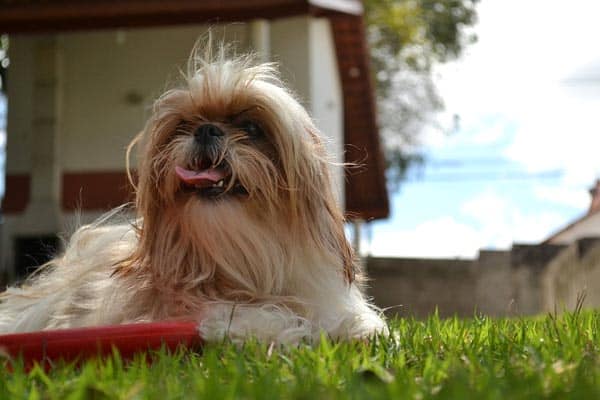How Much to Feed a Shih Tzu: The Perfect Portion

When it comes to feeding a Shih Tzu, there are a few factors to consider, including age, weight, activity level, and overall health.
Puppies require more frequent meals than adult dogs, and their nutritional needs are different as they go through various stages of growth.
It is essential to select top-quality dog food suitable for their age and size and carefully observe their food consumption to avoid overfeeding and obesity.
In their adult stage, Shih Tzus generally need one to two meals daily, depending on their activity level and body weight. Offering them a well-balanced diet consisting of protein, healthy fats, and vital nutrients is crucial.
Owners should also be aware of any health conditions or allergies that may affect their dog’s diet and choose a dog food brand that meets their needs.
Additionally, it is essential to avoid overfeeding and to monitor their weight to prevent weight gain and obesity.
Senior Shih Tzus may require a different feeding schedule or type of food, especially if they have health issues or are less active.
It is essential to choose a dog food that is easy to digest and provides the necessary nutrients to maintain their health and immune system.
Owners should also be aware of changes in their dog’s appetite or eating habits, which may indicate an underlying health issue requiring veterinary attention.
Feeding a Shih Tzu Puppy
How Much to Feed a Shih Tzu Puppy
Ensuring proper nutrition for a Shih Tzu puppy involves thoroughly evaluating its age, weight, and dietary needs.
Shih Tzu puppies, a small breed, have a fast metabolism and must consume food regularly to sustain their energy levels and prevent hypoglycemia.
A puppy should be fed around 4 to 6 times daily, depending on age and weight. Puppies under 3 months of age need to eat more frequently, while those over 4 months can have their meals reduced to 3 to 4 times daily.
To determine how much to feed a Shih Tzu puppy, it’s essential to consider the body weight and calorie content of their food. A Shih Tzu puppy’s recommended daily calorie intake is based on its resting energy requirement (RER), calculated based on its current weight.
For example, if a Shih Tzu puppy weighs 3 pounds, it will need about 88 calories based on its RER. However, this number needs to be tripled for puppies under 3 months of age and doubled for those over 4 months.
It is essential to monitor a Shih Tzu puppy’s weight gain and adjust its feeding frequency and portion size accordingly.
Excessive feeding may cause obesity and health issues, whereas insufficient feeding can lead to stunted growth and malnutrition.
Kind of Food and Feeding Frequency
When choosing the best puppy food for a Shih Tzu, looking for high-quality options that provide balanced nutrition is essential. Dry food is a popular choice, as it helps promote dental health and can be left out for puppies to graze on throughout the day.
However, it’s crucial to consider wet food and formula options, especially for young puppies who may have trouble chewing. It’s important to avoid dog food brands that contain by-products and additives, as these can harm a Shih Tzu’s health.
Regarding feeding frequency, it’s crucial to establish and stick to a routine. Puppies thrive on consistency and may become anxious or agitated if their feeding schedule is disrupted.
Feeding a Shih Tzu puppy requires careful consideration of its nutritional needs and feeding habits. By providing high-quality, balanced nutrition and monitoring their weight gain, owners can help ensure their puppy grows healthy and strong.
Feeding an Adult Shih Tzu
When feeding an adult Shih Tzu, it’s essential to consider their size, activity level, and any health conditions they may have. Here are some guidelines to help ensure your furry friend gets the nutrition they need.
How Much to Feed an Adult Shih Tzu
On average, an adult Shih Tzu should be fed 0.5 to 1 cup of food per day, depending on their activity level.
This should be split into two or three meals daily rather than feeding them all at once. This helps prevent hypoglycemia, a condition that Shih Tzus are prone to due to their small size.
When selecting food for your adult Shih Tzu, consider high-quality options explicitly formulated for small breeds.
Choose a formula that contains protein from sources like chicken, salmon, or lamb and healthy fats like those found in fish and sweet potatoes. Avoid fillers like potatoes and peas, preservatives, and artificial flavors.
Feeding Schedule
In addition to considering how much to feed your adult Shih Tzu, it’s also essential to establish a feeding schedule.
As mentioned, this should include two to three meals per day, spaced out at regular intervals.
You may need to adjust the amount and frequency of feedings based on your Shih Tzu’s current weight, the calorie content of their food, and resting energy requirement.
If your Shih Tzu is a picky eater or seems to have a decreased appetite, there may be underlying health issues, or they may be intolerant to certain ingredients. In this case, it’s best to consult a veterinarian to determine the best action.
Final Thoughts
Feeding your adult Shih Tzu high-quality food is crucial for their health and well-being. By adhering to the guidelines above, you can contribute to your furry companion’s proper nutrition, ensuring they flourish.
Remember to monitor their body weight and adjust their food intake to prevent obesity or underweight issues.
Feeding a Senior Shih Tzu
As Shih Tzu age, their nutritional needs change, and adjusting their diet to keep them healthy and happy is essential.
Senior Shih Tzus often experience a decrease in their eating habits, which may lead to reducing their daily meals to two or three.
They are also prone to developing dental issues, necessitating a soft diet.
How Much to Feed a Senior Shih Tzu
The amount of food a senior Shih Tzu needs depends on their weight, activity level, and health conditions.
On average, feed your senior Shih Tzu 0.35 to 0.41 cups daily, which has 270 to 480 kcal daily. However, monitoring your dog’s weight and adjusting the food intake is crucial to prevent overfeeding or underfeeding.
Choosing the Right Food for Senior Shih Tzus
When selecting food for senior Shih Tzus, it’s crucial to consider their nutritional requirements. Senior Shih Tzus need a balanced diet that includes protein, healthy fat, and essential nutrients to maintain their immune system and overall health.
Look for food specifically formulated for senior dogs and containing high-quality ingredients such as chicken, salmon, lamb, or turkey. Avoid dog food that contains fillers, preservatives, or artificial flavors that can harm your dog’s health.
Feeding Schedule and Frequency
To maintain the health of senior Shih Tzus and prevent obesity, it’s essential to establish a consistent feeding routine. Distribute their daily food portions into two or three meals and provide them regularly.
Monitoring your dog’s food intake and adjusting the amount to prevent overfeeding or underfeeding is also essential. If your senior Shih Tzu is a picky eater, try different foods to find the best one that suits their taste and nutritional needs.
Final Thoughts
Feeding a senior Shih Tzu requires careful consideration of their nutritional requirements and health conditions.
Choose high-quality dog food containing essential nutrients and adjust the food intake according to weight, activity level, and health conditions.
Regular veterinary checkups can help you monitor your senior Shih Tzu’s health early and detect any health issues. Your senior Shih Tzu can enjoy a happy and healthy life with proper care and nutrition.






